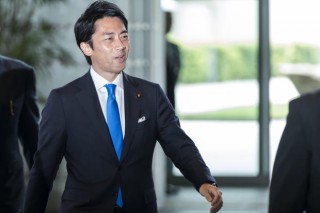Loading
Search
▼ Can Japan's Environment Chief Get Past Gaffes To Ease Country's Ironic Dependence On Coal?
- Category:Other
Tokyo — It wasn't the most auspicious coming-out for an environment minister. Sweeping into New York for the U.N. Climate Summit, 38-year-old Shinjiro Koizumi approached his first foreign assignment with the same savoir faire he deploys to great effect at home.
The son of a popular former prime minister, Koizumi has been compared by Western analysts to the likes of JFK and (pre-scandal) Justin Trudeau. He wears his celebrity and political pedigree like a halo. But in New York this week, the trademark fluid self-assurance and fluent English — both rare commodities in a Japanese politician — seemed for once to betray him.
First there was the "steak" comment. Asked what he wanted to do while in New York, where he had studied at Columbia University, Koizumi said he'd love to have a steak "every day."
When it was pointed out that cattle farming is considered a prime culprit behind the global warming he was ostensibly there to help address, Koizumi's response left listeners wondering, where's the beef?
"If this makes the news, it would be a good chance to get Japanese thinking about the environment!" He later rhetorically asked reporters, "Aren't there times when you feel like a treat?"
Then there was his "sexy" remark. During a news conference, he made a point of skipping the translator and answering questions himself in English.
"On tackling such big-scale issues like climate change, it's gotta be fun, gotta be cool, gotta be sexy, too," he said. His choice of the phrase compelled Japanese news media to assure readers and viewers that, no, the minister wasn't actually talking about sex.
Members of Japan's climate action community said they're trying to take the bad optics in stride.
"Of course we were disappointed," said Kimiko Hirata, international director for Kiko Network, a leading non-profit organization fighting climate change. "He was unprepared, and this was the result."
Hirata said Koizumi is still "an unknown quantity," and she remains guardedly optimistic that the independent-minded son of one of Japan's most popular, pro-green-energy prime ministers will be able to steer Japan toward a more climate-friendly energy mix.
ukari Takamura, a professor at Tokyo University's Institute for Future Initiatives, is also trying to look past this week's gaffes: "I didn't expect his leadership at this point," she said, noting Koizumi has occupied the post, his first cabinet position, for just two weeks. "But if we really wish climate action to be sexy or cool, I hope he shows, as soon as possible, how Japan can go to a decarbonized society."
And there's a lot of work to do.
Hi-tech country, old-school power
Japan is the world's technology Mecca, and it has a progressive reputation; at next year's Tokyo Olympics, athletes will compete for medals made of recycled metal and sleep on recycled cardboard beds. But Japan's energy policy is in many ways mired in the past.According to global climate change and energy policy think-tank E3G, Japan is the only G-7 country still pursuing coal plant construction at home and abroad.
After the 2011 Fukushima nuclear disaster, and the subsequent shutdown of virtually all of Japan's nuclear power plants, "government and business started seeking cheap power," Professor Takamura told CBS News. "Since there's no carbon pricing here in Japan, coal is considered cheap."
While renewables, including hydropower, rose to an estimated 17.4% of Japan's energy supply mix last year, fossil fuels, including oil and natural gas, account for most of the rest. Coal alone still supplied 28.3% of Japan's power in 2018. By comparison, the much larger energy demands of the United States were met with 18% renewable power in 2018, and the U.S. relied slightly less on coal among the fossil fuels, at 27%.
In both countries, and in spite of the Japanese government's push to develop new coal-fired energy plants, the trend in recent years is toward more renewables and less fossil fuels.
Even as the government in Tokyo forges ahead with "clean coal" technology, some of Japan's leading corporations, including life insurers, banks and consumer product companies, are moving increasingly away from investments in the field.
Advocates are counting on the new environment chief — seen as a possible future prime minister — to get that message, and help turn it into policy.
- September 27, 2019
- Comment (0)
- Trackback(0)


